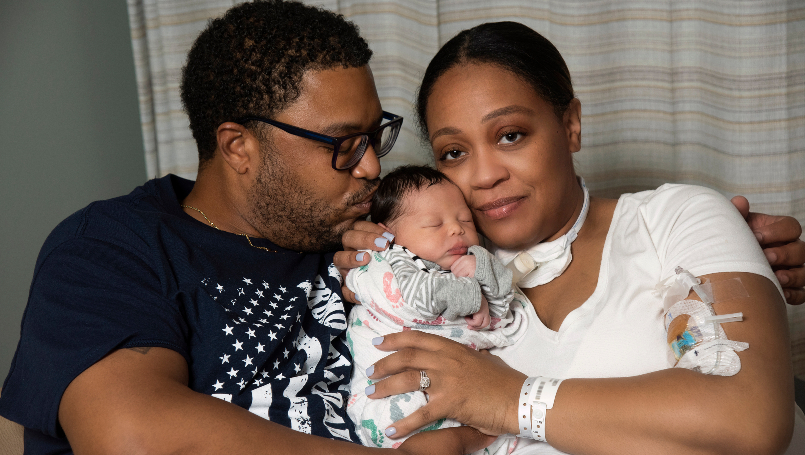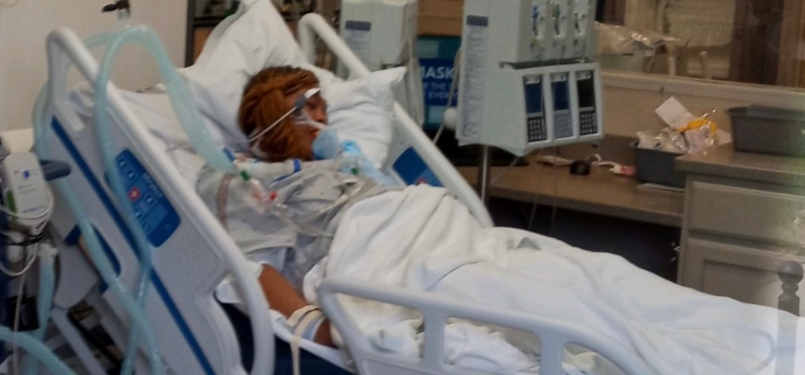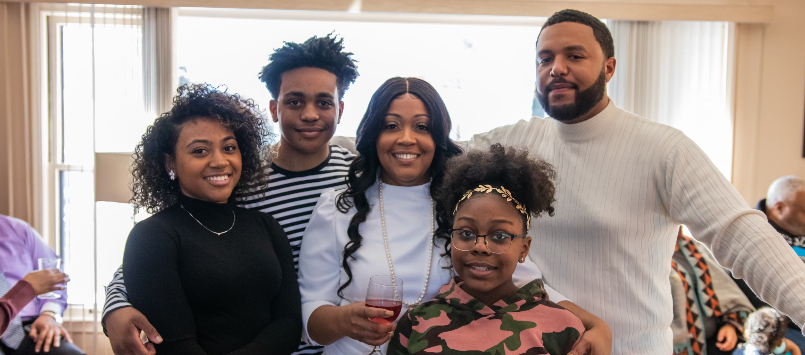Monday, December 20, 2021

Experts recommend vaccination for pregnant women and those considering pregnancy
Nakia Hubbard Heard, 46, of Inkster, was 23 weeks pregnant when she tested positive at Beaumont Hospital, Wayne, with COVID-19 this past March and placed on a ventilator.
She has no memory of it, but two days later, she was airlifted to Beaumont Hospital, Royal Oak.
Nakia’s care team approached her husband, Janard, with the most impossible of questions: ‘What should they do if it came down to saving Nakia’s life or the baby’s?’
For Nakia, the scariest moment came when she woke up alone and restrained in a hospital bed, lights flashing, alarms sounding, and no idea how she got there.
“I lost a week of my life,” Nakia said. “To this day, I have no memory of it.”

According to the most recent data from the Centers for Disease Control and Prevention (CDC), only 31% of pregnant women are vaccinated against COVID-19. Currently, approximately 20 pregnant women are hospitalized at Beaumont Health with COVID-19
Back in March, Nakia was newly eligible for the vaccine, but little data was available about its safety in pregnant women. Michigan was in the midst of its third surge. And Nakia, an occupational therapist who believes she contracted the virus from her family, was unvaccinated.
“When the vaccine first came out, there was no theoretical risk to pregnant women in any trimester,” said Nakia’s doctor, Karoline Puder, M.D., a maternal fetal medicine specialist at Beaumont, Royal Oak. “But it’s not surprising pregnant women were afraid to try something new.”
Now, the scientific community has a full nine months plus of data and research to look to for validation.
“We have strong evidence that there is no tendency for this vaccine to cause reproductive harm,” Dr. Puder said.
Similarly, there is no evidence of fertility challenges, miscarriage, birth defects or growth abnormalities.
There is, however, strong evidence of increased risk to mother and baby from COVID-19, Dr. Puder said.
“It is critically important that every woman who is pregnant, breast feeding or considering pregnancy gets vaccinated,” said Kurt Wharton, M.D., chief of Women’s and Children’s Clinical Care Programs for Beaumont Health. “Compared to non-pregnant women, pregnant women who contract COVID-19 are at high risk of requiring hospitalization, requiring admission to the ICU and requiring intubation.”
Additional complications related to pregnancy include pre-eclampsia and premature birth, Dr. Puder added.
One of the lucky ones, Nakia was successfully removed from the ventilator in just five days.
However, her airway was so damaged by the virus, “it felt like I was breathing through a straw,” she said.
Doctors gave Nakia a tracheotomy to improve air flow. Over the next 12 weeks, Nakia had three surgeries to repair the damage.
As she slowly regained her strength and staff taught her how to walk again, Nakia tried to prepare herself mentally and physical for the upcoming delivery.
“I was afraid I wouldn’t be able to push. I was also afraid I would go into respiratory failure,” Nakia said. “The trach was in place, but I thought I might have to go back on the vent, or die trying to deliver the baby.”
When her son, Saint Dalton Rocco Heard, was born healthy three weeks early via urgent cesarian section on July 8, Nakia, Janard, her family and her entire care team rejoiced.
“Relief, gratitude, joy; those words aren’t big enough to describe how I felt that day and today,” Nakia said. “I still struggle with shortness of breath. I can't bathe my son in the tub because I can't get up from the floor without help. I can’t carry him in his carrier longer than a couple minutes. I'm unable to walk long distances. I struggle with memory issues and body aches. My voice is weak and I can’t carry on full conversations without getting winded. Even just reading a story to Saint tires my voice out, but I’m alive.”
Instead of focusing on the challenges this holiday, Nakia and her family are focusing on their blessings - and, of course, the miracles.
“I'm so grateful for the entire team at Beaumont, Wayne and Royal Oak,” Nakia said. “Especially the antepartum team, Dr. Puder and her staff, who were so meticulous and thoughtful with their care. They fought hard for Saint and for me. I want to thank Annie, an ICU nurse who took great care of me, even when I wasn’t in the mood.”
“I’d like to say thank you to the RN on antepartum who took me outside for the first time in more than a month, to let me feel the sunshine again. To Nicole, who helped me learn to swallow and eat again. To Tony, who taught me how to walk again. To the nurse who held my hand up until the very moment they started my first surgery, because I was so scared. To the doctor who brought my husband a birthday card and a small gift, because I was upset I wasn't home for his birthday. And honestly, there are so many others to thank.”
“I’m alive. Saint is alive. We are safe and living our best possible life. And, that is everything.”

According to the CDC
- People who are pregnant or recently pregnant are more likely to get severely ill with COVID-19 compared with people who are not pregnant.
- Getting a COVID-19 vaccine can help protect against severe illness from COVID-19.
- COVID-19 vaccination is recommended for people who are pregnant, breastfeeding, trying to get pregnant now, or might become pregnant in the future.
- People who are pregnant may receive a COVID-19 vaccine booster shot.
- Evidence about the safety and effectiveness of COVID-19 vaccination during pregnancy continues to grow. This data suggests that the benefits of receiving a COVID-19 vaccine outweigh potential risks of vaccination during pregnancy.
- There is currently no evidence that any vaccines, including COVID-19 vaccines, cause fertility problems in women or men.
